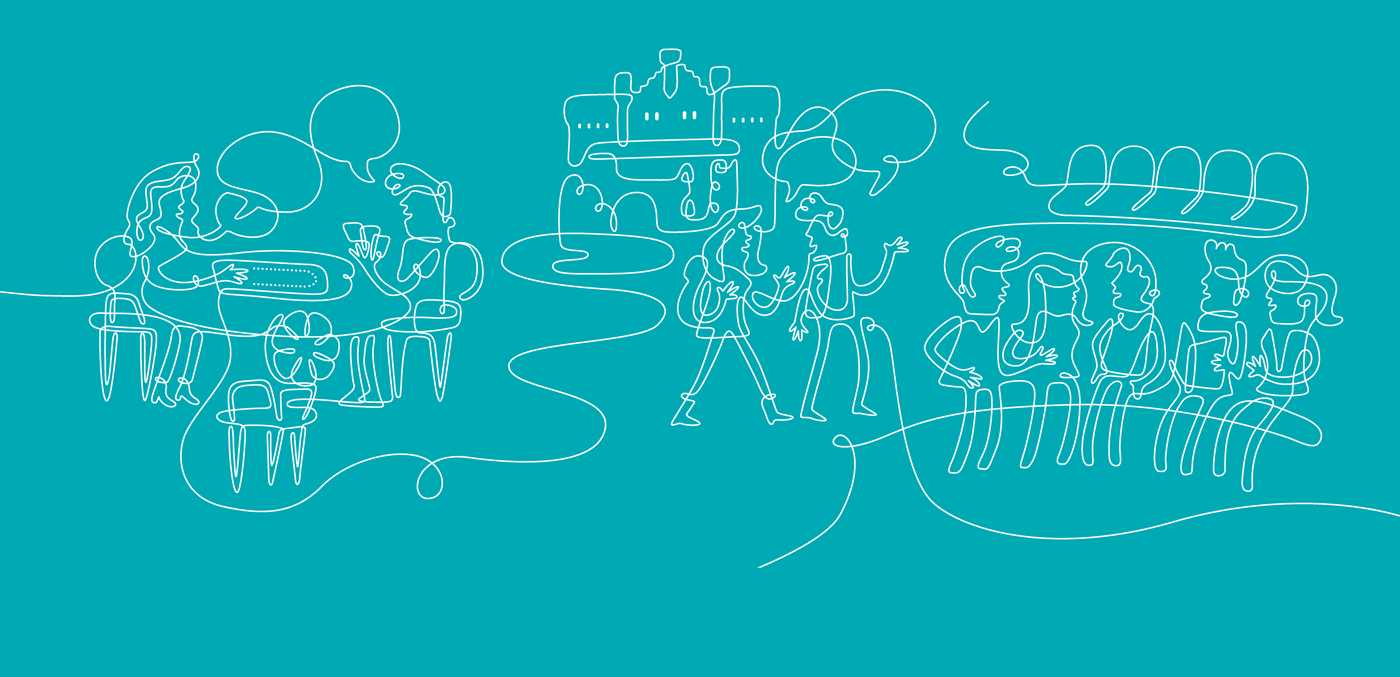
Room for Debate
In a polarized world, UW–Madison fosters tough conversations.
On a warm autumn afternoon when I needed it badly, I got a shot of hope for the future of conversation. Pulling up a chair at the Memorial Union Terrace and eavesdropping there under the old oak trees, I heard brilliant debate by research scientists about the best way to get a stubborn gene to express. At another table, there was virtuosic smack talk accompanying a game of cribbage. These lovely (loud!) sounds are ear candy after the deafening silence of being among too many people staring at their phones. They confirmed for me that the great collegiate tradition of chewing the fat with friends lives on.
But I still worried about our collective capacity to have deep conversations about tough topics with people who aren’t already our friends or colleagues and who we suspect see the world from a different perspective. Research shows that, for the first time in more than two decades, members of both political parties have strongly unfavorable opinions of their opponents. And our society is highly subdivided in other ways, so that people often end up congregating almost exclusively — in real life and through online communities — with others who share the same racial, religious, and demographic profiles.
Luckily, though, many at UW–Madison are actively seeking, encouraging, and developing the ability to discuss difficult topics fruitfully. Students are seeking out opportunities to talk through some of the biggest matters on their minds, and they (like many faculty members) are eager to argue respectfully and learn more about what they don’t understand. And those of us eager to reclaim conversation — the face-to-face kind — as a means for sifting through the complexity of contemporary life and building bridges can learn a lot from listening to what people on campus are doing.
Fireside chats
Later last fall, I joined the student-run Afternoon Conversation Series, a regular all-comers-welcome meetup held beside the flickering hearth of the Prairie Fire coffee shop inside Union South. I found about a dozen undergrads and graduate students listening intently as the day’s invited guest, Sumudu Atapattu, director of the UW Law School’s Research Centers and a specialist in international environmental law, spoke in soft, serious tones about the impacts climate change is already having on daily life in places vulnerable to rising sea levels, including parts of Alaska.
Though the legal and human rights implications of climate change Atapattu detailed were sobering, the students present seemed undaunted, going on to pepper her with thoughtful questions about how they might help push for change. One young woman wondered if she could combine her interests in law, science, and economics in a career. Absolutely, Atapattu says. If we’re going to meet the challenges of climate change, “all of those disciplines need to learn how to communicate with each other.”
Last year the group also discussed the status of the young immigrants known as DREAMers and international women’s health. After the conversation, one of the group’s organizers told me that the aim of these intimate talks on serious topics is to give students a chance to interact with professors without “the usual intimidating student–teacher power dynamics.”
The art of argument
UW mathematics professor Jordan Ellenberg is a fellow at the Wisconsin Institute for Discovery and professional-grade curator of talk — one of those classic social network figures who’s as comfortable discussing baseball and James Baldwin as he is breaking down the intricacies of multivariable equations. Over tea at a café near campus last spring, Ellenberg says that, for him, a key benefit of working at “this gigantic, multifarious institution” is having many opportunities to chat and mind-meld with researchers working in far-flung disciplines, who often shed surprising new light on his work, and he on theirs. But he also enjoys the “intellectual exfoliation” he receives as a result of speaking with other faculty members who aren’t afraid to challenge conventional wisdom and “push you to expand and enlarge” how you view an issue.
One such stimulating loofah figure Ellenberg always likes being “a little conversationally scraped by” is Harry Brighouse. The UW philosophy professor has argued on his popular blog and at various campus gatherings on teaching methodologies that the standard, top-down instructional model many American college classrooms follow does students a disservice. Research shows that college students (and adults generally) can pay attention to a single speaker for only about 20 minutes. So Brighouse makes a deliberate point of beginning classes with a short lecture, but then largely ceding the floor to his students.
To keep the conversation on track — or to redirect when one or more students begin to dominate a group discussion — Brighouse continues to dole out questions carefully. And he has his students — most of whom are accustomed to socializing mainly with their dorm and apartment mates — introduce themselves to each other over and over. It’s a strategy inspired by his own experience as an undergraduate at King’s College London, where he not only took all of his classes with the same group of people, but lived and ate meals with them, too, sparring over philosophy and history all the while.
And his chief aim, he explains, is to help students burn through shyness to become friends and strong intellectual debate partners for each other.
“Some of my students come to college reeeeally reluctant to argue. But even they will eventually say, ‘What are we going to argue about next?’ They’re really hungry for this,” Brighouse says.
Describe your path
In his cozy office decorated with vintage school maps and a stellar collection of LEGO Star Wars ships, Greg Downey, associate dean for the social sciences in the College of Letters & Science, keeps a small conference table. Students know they can sit down and discuss their aspirations and future plans, bouncing ideas around until they land on ones that feel, if not perfect, then good enough for now. And it’s here — as well as in the college’s popular Taking Initiative professional planning course, which Downey leads, and its new SuccessWorks career center — where Downey and his colleagues are invested in helping students get hands-on experience and find the right words to describe their evolving skills and interests to prospective employers.
Companies consistently report that they consider strong verbal and written communication skills essential for hiring, and there’s evidence from social psychology showing that creating an overarching narrative (aka storyline) for your life helps people gain healthy perspective and move ahead fruitfully. Downey has each of his students develop a “two-minute career story” and practice delivering it with classmates. Some struggle with the assignment. Maybe they’ve heard that speaking about your accomplishments amounts to bragging, or they’re still not entirely sure what they want to do with their lives, Downey explains. But once they hear other students sharing similar stories and realize that it’s okay to be still exploring options and just say this plainly, they usually get more comfortable.
But there are other reasons why he thinks it’s important for him, and faculty and staff at colleges everywhere, to be available to speak with students about whatever’s weighing on their minds. “UW students are accomplished and goal-oriented,” Downey says. “If you set them a task, they will work through it.” But he and other campus advisers have also realized — partly in light of the fact that the number of college students seeking treatment for anxiety and depression has shot up in recent years — “that we need to be continually active in encouraging our students to talk with us, and talk with each other,” he says.
Beyond managing coursework, many students today face “family pressures, peer pressures, [and] pressures from jobs. Technology pervades their lives, and while sometimes it helps them cope, sometimes it ratchets those pressures up.”
Group dynamics
More and more, students and faculty are seeking out and welcoming conversations where they can feel not only free, but encouraged to unfurl — working through difficult thoughts together with others in an unhurried way, saying things they’ve never said (or thought) before, opening up new doors of understanding to combat distrust.
Last fall, the UW released its Campus Climate Survey, which found that, while most students find the campus to be a safe, welcoming, and respectful place, students of color and from other historically disadvantaged groups consistently rated the climate less favorably overall than students from majority groups did. And since then, the work of various UW discussion programs created to foster greater equality, inclusion, and understanding across differences has taken on new urgency.
One such program, run by the UW School of Education’s Department of Counseling Psychology, is Diversity Dialogues. When it started almost 15 years ago, the big, burning divide that students wanted to discuss was the difference between students from the Midwest and the coasts. But now that issues of racial discrimination, gender nonconformity, and economic disparity have shot to the forefront of national news, students from different racial, ethnic, gender, and class backgrounds are eager to meet and talk about how these dimensions have shaped their experiences and perceptions.
UW professor of counseling psychology Steve Quintana, who directs Diversity Dialogues, says that one of its primary objectives is to help students recognize that all people (not just those who are obviously similar to them) are “living rich, interesting, and complex lives.” The theory behind deepening social understanding is that it makes it easier for people to understand and appreciate (if not always love) why others may act a certain way or hold a certain view.
To help students who typically have never met before they start talking, Quintana and other dialogue facilitators give participants different cues, such as asking them to describe pivotal childhood experiences or their own negative or positive experiences of diversity. A running rule is that no one can interrupt whoever is speaking for at least 90 seconds. Facilitators also work to sustain a respectful balance by reminding participants that every person’s perspective and personal experience are valid.
They also point out that mixed-company conversations on race, in particular, have a tendency to become “one-sided white confessionals,” wherein white students wax on describing their guilt over certain societal privileges they’ve enjoyed, at the expense (in terms of comfort) of black students in the group. But just naming the potential dynamic up front and noting that it can place additional burdens on black students is a surprisingly effective way of keeping it at bay, Quintana says.
After they’ve participated in the program, many students tell him that learning how to trade notes on class, race, sexuality, and other topics in a calm, non-adversarial setting (unlike so many of the combative finger-pointing sessions we see on TV today) made them feel more flexible and open — and eager to keep speaking with people who aren’t obviously like them. Getting new “windows into the depths of people’s experience is rewarding,” Quintana says. Once they’ve realized that everyone has an interesting story to tell, students often say they’re more likely to break the ice with strangers in everyday settings.
Comfortable with uncomfortable
UW professor Christy Clark-Pujara often spends the first few sessions of her classes on African American history and the history of slavery speaking with students about why it’s important for them to be able to discuss race together, even though it’s a subject many of them have been told to avoid. And she explains that “it’s okay to feel uncomfortable in this class, and even a good thing, because that’s where you learn and grow.” Clark-Pujara knows most of her students have so far been taught only the scantest rendition of black American history: “First there was slavery. That was bad, but some people were nice. Then there was Martin Luther King and the Civil Rights movement, and now everything’s fine.” But then she begins fleshing out that time line with stories that fly in the face of certain well-oiled myths, including the myth that slaves did little to resist their circumstances.
“When you look at the primary documents, the history of slavery becomes a history of great resistance — not only physical, but moral, emotional, and cultural resistance,” Clark-Pujara says. She also disproves the folkloric belief that Wisconsin was always free of slavery. French-Canadian trappers brought slaves with them when they settled here in the early 1700s. When Southerners — including Henry Dodge, two-time governor of the Territory of Wisconsin — arrived in the early 1800s to mine for lead in the southwestern part of what later became the state, they had slaves with them, too.
At some point during the semester, students of different races overflow with “indignation” over never having been given an inkling of this richer, more complicated history. Clark-Pujara is there for all of it, ready to help them talk through and process “the terribly uncomfortable” fact that the “economic ascent of the United States rests on the backs of enslaved black people.” Empathy is a major theme in the class, she adds.
As we neared the end of our own conversation, Clark-Pujara pulled out two thank-you notes she had just received from students who’d taken her Introduction to African American History course. Each described a different way in which the class and Clark-Pujara’s teaching had changed not only their minds but their lives. The notes were beautiful. And they reminded me why talk, at the UW and everywhere, is so vital to staying alive and engaged: our world is never going to be perfect, and individuals and systems will inevitably let us down. But we should by no means withdraw and give up.
By debating and grappling with new ideas together with others, in real time — riding tides of confrontation without getting too rattled, watching one another’s faces light up and fall and light up again — we get to take another look at what we think, and make it better.
But we can’t get there through silence.
Louisa Kamps is a freelance writer based in Madison.
Published in the Spring 2019 issue
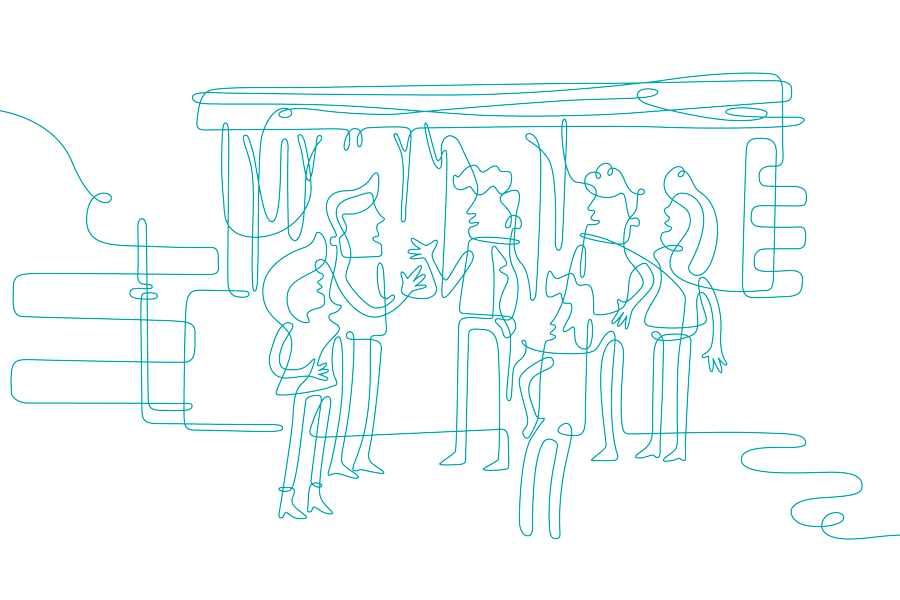
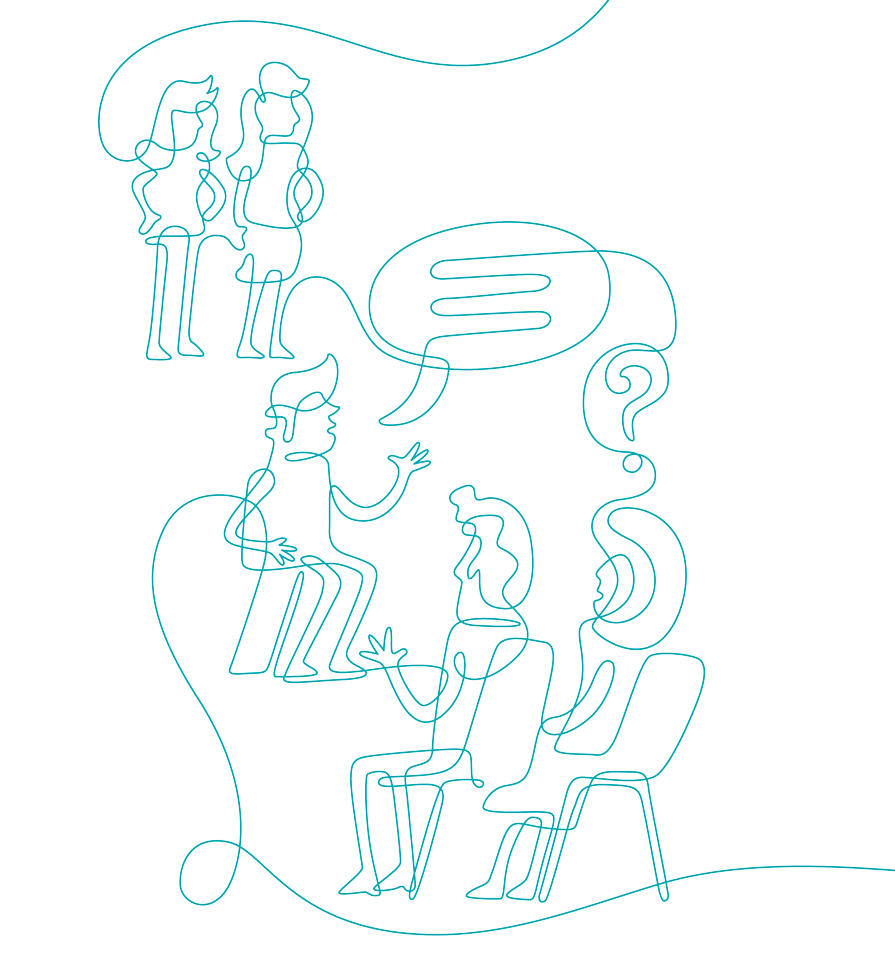
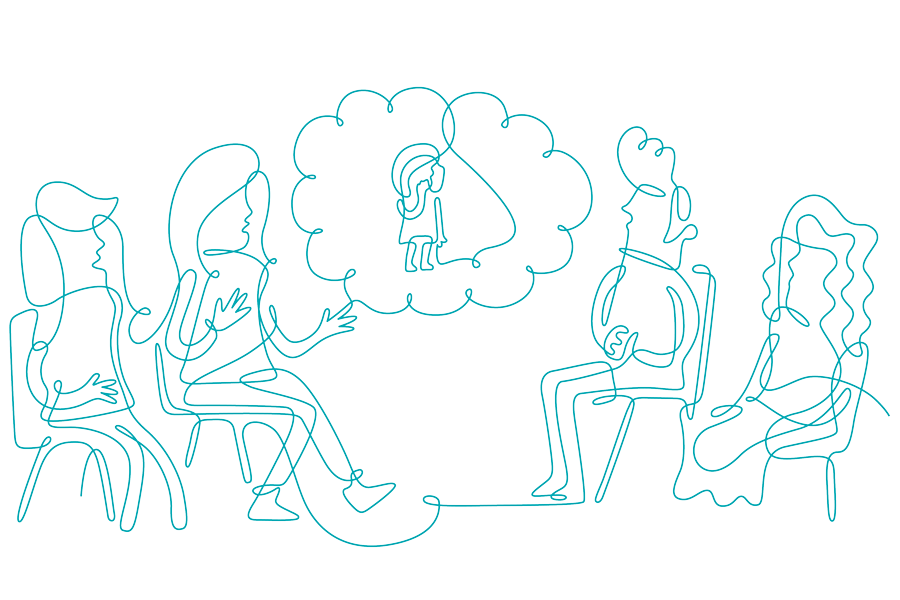

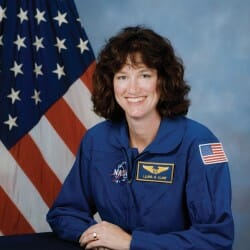
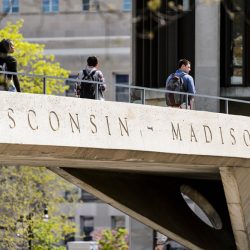
Comments
No comments posted yet.